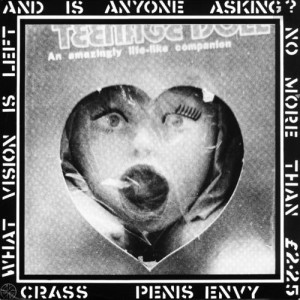Crass – Penis Envy Crass Records 321984/1 (1981)
Crass delivered their finest studio album with Penis Envy, though the album set in motion the forces that would eventually dissolve the band. Later faced with obscenity charges, for this album and others, the legal battle to eventually beat most of those charges (except for the song “Bata Motel”) put a strain on the group they couldn’t really survive — their decision to disband in 1984 also coincided with supposedly earlier plans to call it quits after a few years. Though really by the mid 1980s the punk movement had dissipated and the legal troubles, changes in personal outlook and interpersonal frictions amongst members almost seem like convenient excuses for the band to call it quits. Still, the essence of Penis Envy is a classic punk dare: mocking the powerful to provoke them to show their impotence and powerlessness to prevent the mockery. Sure, the lawsuit left the band with some wounds, but the music survived, to embolden anyone who hears it.
The subject matter of the songs is decidedly feminist. The album title refers to Sigmund Freud‘s theory of female sexuality, a concept that has been criticized — as recounted in The Story of Crass drummer Penny Rimbaud called it “one of Freud’s more absurd theories” in a 1983 interview — but in some ways aspects were rehabilitated by Jacques Lacan‘s way of symbolizing jouissance that saw “penis envy” as just a signifier of a fundemental lack (among many other signifiers of lack) and giving women greater awareness and choice in such matters than men. The song “Where Next Columbus?” invokes C.G. Jung, and goes so far as to critique medical profiteering — “You’re not yourself, the theory says / But I can help, your complex pays / Another’s hope, another’s game / Another’s loss, another’s gain.” With all the other thinkers mentioned in the song, the song suggests the limits of ideas and intentions, and that even the greatest thinkers can’t stop others from using their work for repressive control, and to amass power for nefarious, self-serving purposes. Or maybe it is just a contrarian slam against famous intellectuals of all sorts. All that aside, Crass can invoke the term “penis envy” to critique patriarchy.
The opener, “Bata Motel,” offers a first-person account of a submissive, oppressed, hyper-sexualized woman. The premise of the song is to make male fantasies seem crude and horrible, building the case that those perpetuating such treatment of women should feel guilt.
Most of lyrics avoid casting blame on individuals. For instance, “Systematic Death” is an indictment of exploitative systems, such as patriarchy and capitalism.
“Our Wedding” was given away as a flexi-disc (cheap 45 RPM recordings on flexible square sheets) with the magazine Loving as a prank — credited to Creative Recording And Sound Services (which translates to the acronym CRASS). It was tacked on to Penis Envy. The song itself is a parody of sappy music. Though it is also not a bad song.
A big part of what makes Penis Envy so great is the musicianship. Eve Libertine handles most of the vocals, with Joy de Vivre singing one song (“Health Surface”). Libertine is a more versatile and adept vocalist than Steve Ignorant, Crass’ primary vocalist who does not appear on the album. Drummer Penny Rimbaud is able to summon lilting military march sounds, jazzy fills, and itinerant punk rumbles. There are heavy bass lines here, from Pete Wright, that are fairly prominent in the recording mix. The guitars (Phil Free and B.A.Nana [AKA N.A. Palmer]) noodle around, usually in an icy, brittle, high treble range, never quite assuming a dominant role. It is the very deferential stance of the musicians, true to their anarchist political roots, that refuses to privilege any one performer or part above the others. Yet the focus and structure on Penis Envy advances the music further than the sort of chaotic, same-sounding fury of most stereotypical anarcho-punk.
There is a thing about an “anarchistic” approach to music making. When the musicians simply play whatever they want, with only the loosest sense of pre-planning, the process of making the music may avoid exploitation of the musicians, but the results can put a heavy burden on listeners to make sense of something that presents no clear meaning. On the one hand, there is an attempt to avoid imposing beliefs on a listener, who can make his or her own meaning. But the real catch is that musicians cross a line, of sorts, when they actually go about recording and releasing such material, which strips them of any claim of being completely above or apart from coercive imposition of meaning on the listener. This is a tricky issue, and there is no right or wrong level of demands upon a listener. The band is sometimes criticized for putting too many demands on the listener with their later works, like Yes Sir, I Will (1983). But Penis Envy is probably the most coherent (and melodic) of all of Crass’ full-length albums. There is much more focus and deliberate songwriting on Penis Envy than earlier (or later) Crass recordings. There are some similarities to Lora Logic‘s band Essential Logic. Though, surprisingly, on these recordings Crass seems less improvised and less experimental.
To get into Crass, typically, listeners have to be willing to be (righteously) angry. Most of their music is built around takedowns of hypocrites and evildoers. They pointed a lot of fingers. They could get away with it because they lived up to their ideals more than the next band. Still, this wasn’t for everyone. Penis Envy doesn’t come across quite the same way, though. The approach is more bait-and-switch. They try to put forward concepts that are kind of widely accepted, then they render those concepts problematic. Decades later, this still holds up as something that pushes all the right buttons and pushes in the right direction toward a better world.

